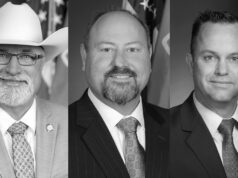

Gov. Mary Fallin has officially announced Monday as the start date for Oklahoma’s second special session of 2017. In contrast to her first special session call, Fallin has also outlined only one issue for lawmakers to tackle.
Fallin’s executive order dropped around 6:30 p.m. tonight, and it stated:
I recommend the following subjects for the Legislature’s consideration:
To provide funding for FY18 to the Oklahoma Health Care Authority to avoid provider rate cuts.
While it does not address the state’s budget at large, Fallin’s announcement comes hours after Paul Monies of Oklahoma Watch broke news that the Oklahoma Health Care Authority is in jeopardy of losing hundreds of millions of dollars in federal funding for the state’s two teaching hospitals.
Shortly after issuing her executive order, Fallin released a press release elaborating on the reason the special session call is not broader.
“This week’s discussions with a bipartisan group of legislative leaders along with community leaders’ input, it was determined we need more time to work toward a long-term, predictable solution to fix our budget problems,” Fallin said in the release. “For next week, immediate attention must be given to the funding situation at the Oklahoma Health Care Authority. It’s difficult to restore cuts in provider rates once they are made.”
The press release said the OHCA’s shortfall was only partially addressed during the Legislature’s first special session:
The Oklahoma Health Care Authority lost $70 million when the state Supreme Court struck down the proposed $1.50-per-pack cigarette cessation fee. A budget bill at the end of the special session in November restored $22.8 million for the authority, which oversees Oklahoma’s Medicaid program, called SoonerCare. The governor vetoed parts of the budget bill, leaving the critical health care funding intact, with the intent to call lawmakers back for a second special session to approve long-term funding issues.
The 2018 regular session is scheduled to convene Feb. 5, but Fallin’s veto at the end of the year’s first special session meant the state does not have a balanced budget for the second half of the 2017-2018 fiscal year, which ends June 30.
FOLLOW US BOX
Follow NonDoc for #okleg news:
Background ahead of second special session
But with a stand-alone cigarette tax appearing unlikely to receive support from House Democrats, negotiations moved to a revenue bargain including multiple tax increases. The Senate pushed for such a package to include a gross production tax increase, but a House floor vote fell five members short of passing into law.
Fallin and others have said the 2018 Legislature will start with a revenue hole of more than $600 million owing to continued use of one-time funds to fill previous gaps.
At the same time, financial problems at the Oklahoma State Department of Health have placed significant political pressure on the executive branch. House members have been investigating the situation from a political perspective, while the attorney general’s office has been investigating for potential criminal activity.
Fallin’s executive order
https://nondoc.com/wp-content/uploads/2017/12/SpecialSession2_1791.pdf” height=”450px” download=”all”](Update: This post was updated at 7:05 p.m. Friday, Dec. 15, 2017, to include comments from Fallin.)




















